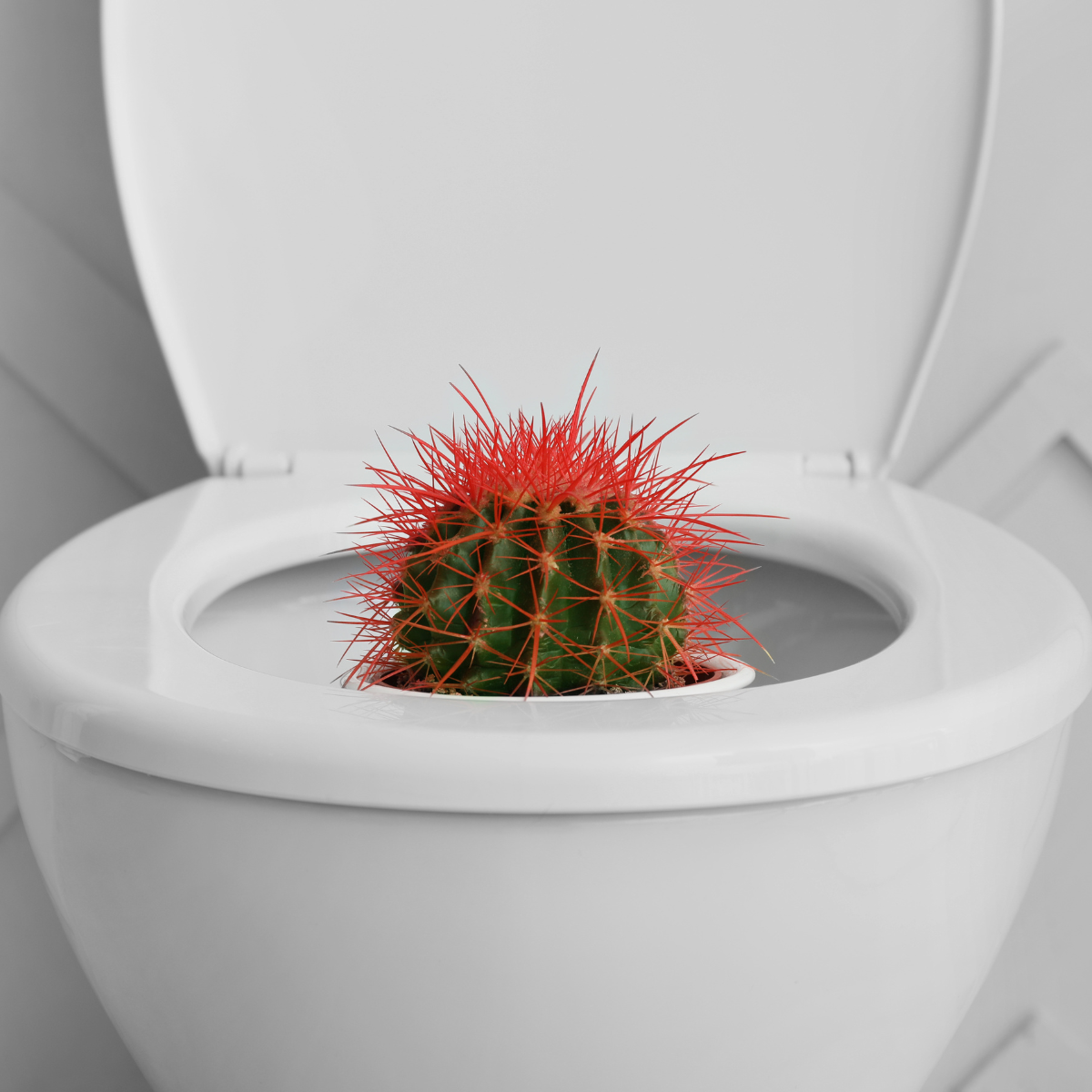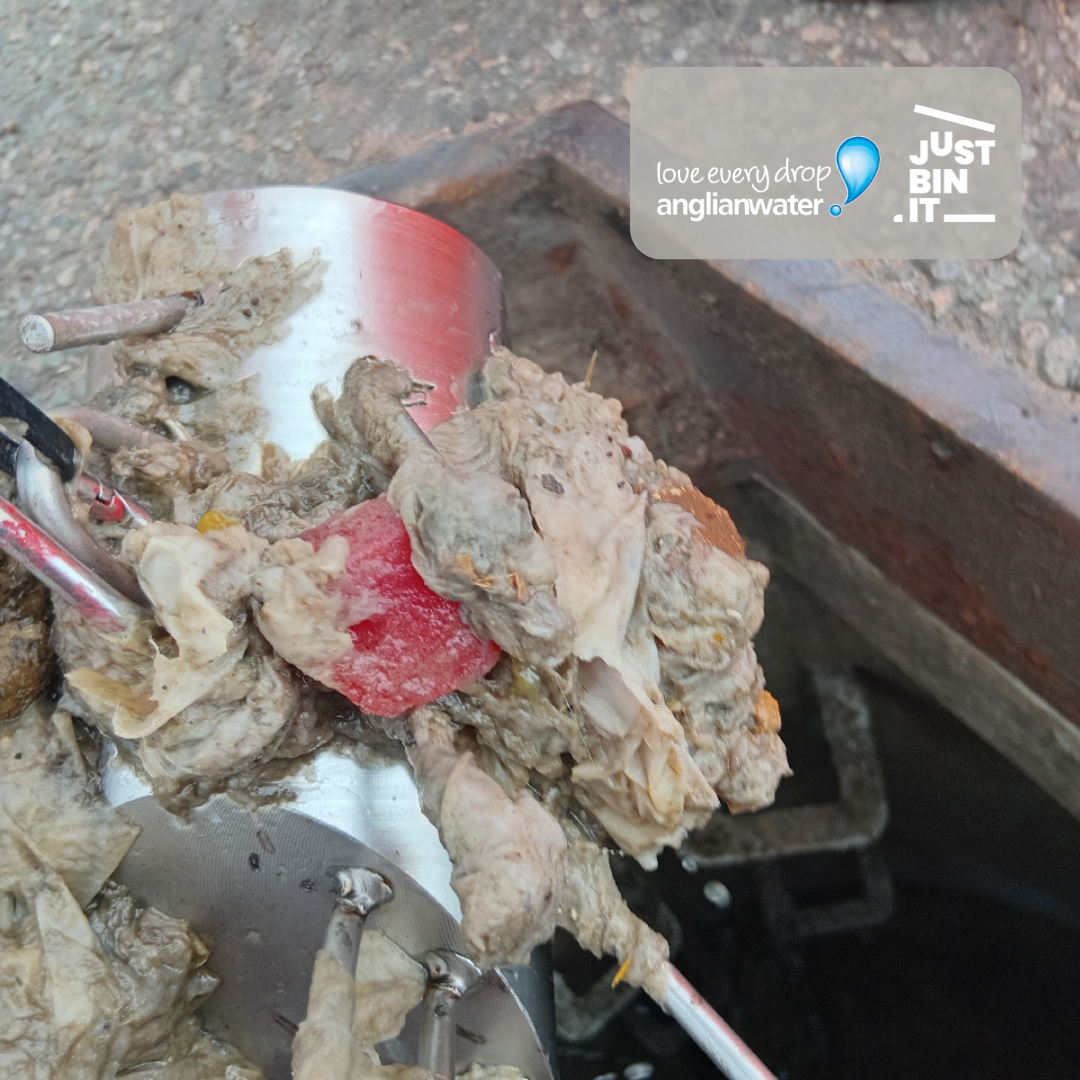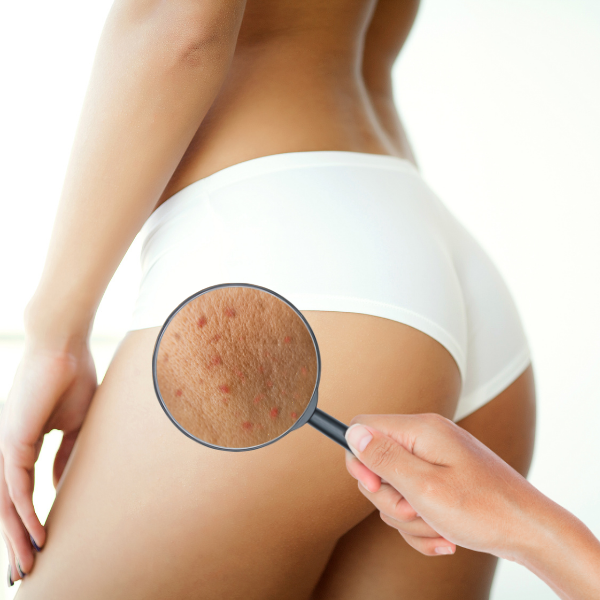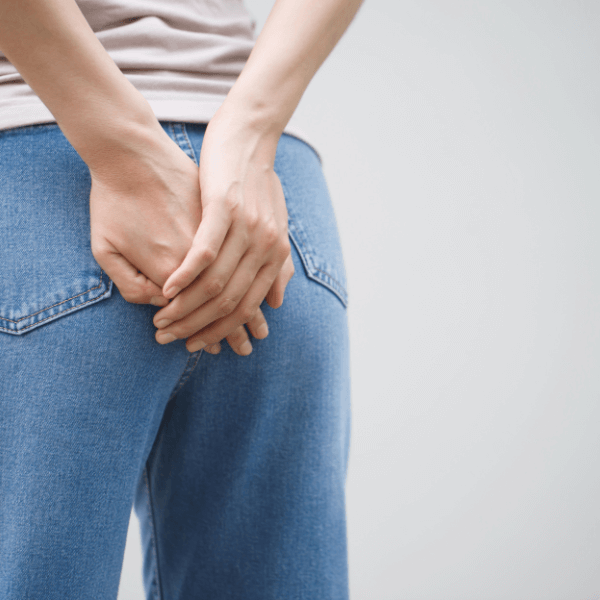Haemorrhoids, are the myths piling up?

Haemorrhoids, are the myths piling up?

Most people will have to deal with haemorrhoids (more commonly known as piles) at some point in their lives. However, we rarely hear people speak about them, and if we do it’s usually followed by either shameful silence or a punchline.
We really shouldn’t be embarrassed because amazingly, 80% of people will experience piles at least once in their lifetime! So, if you are suffering from haemorrhoids, there’s no need to feel like you’re alone on this issue.
If they are so common, you may well ask, why do we get haemorrhoids? To answer this question, let's take our backsides to basics. Welcome to Haemorrhoids 101.
What’s the craic, and what are piles?
The inside of your bum is lined with spongy tissue supplied with blood vessels – the anal ‘cushions’ – and they help it to close so that you remain watertight and continent. They are also rich with nerves, which help tell the brain when it's time to go to the toilet.
We think that ‘anal cushions’ just sounds like a poorly marketed pillow for your bum, but that’s just us. However, they are a normal part of our anatomy, until they go wrong, when they turn into ‘piles’.
Piles occur when the pillow-like clusters of veins become enlarged and swollen. They typically look like small, round, purple lumps that can sometimes poke out the bottom. You might be able to feel them on your anus or hanging down from your anal canal.
How do you get piles?
There are multiple reasons why your life could be rudely interrupted by piles. For example, during pregnancy or the post-partum period many women will experience these symptoms (due to hormonal changes and extra pressure on your pelvic area). They may also occur during periods of erratic bowel movements (like traveller’s diarrhoea or IBS) or when using strong painkillers that cause constipation. There are some other common causes to be aware of:
-
Straining whilst opening your bowels
-
Sitting on the toilet for too long (that means more than 2 minutes, so no more phones on the loo!)
-
Not having the right toilet position (the best position is to lean forward with your knees higher than your hips - a small stool can help)
-
Eating a low-fibre diet.
-
Not drinking enough fluid during the day
-
Family history – it can run in families
This explains why haemorrhoids are so common! And yet, for such a key piece of lifestyle knowledge, these common causes are kept pretty hush hush!
Worry not, we’re here to shed some light on where the sun don’t shine.

The Symptoms
Don’t know what piles symptoms look like? Check these out:
-
Bright red blood after you poo, which is typically on the paper
-
An itchy anus
-
Feeling like you still need to poo after going to the toilet
-
Mucus in your underwear or on toilet paper after wiping your bottom
-
Lumps around your anus
-
Pain around your anus
If you are experiencing any symptoms of bleeding from your bottom or a persistent change in your bowel habit, you must seek help from your doctor. It is NOTHING to be embarrassed about and it's important to make sure you don’t have a cancer of the bowel.

How are piles treated?
1 in 5 people are too embarrassed to go to their GP for help for their haemorrhoids. But you need to be examined by a doctor, who will feel inside the bottom. They may also look with a small plastic tube called a proctoscope.
Treatment usually comes in the following forms:
-
Constipation is the enemy! Although the causes of this are multiple, changing your diet is an important factor in preventing constipation - Make sure you are having plenty of fruit and vegetables (5 portions a day please or 30g of fibre). Eating a diet high in fibre and consuming the right amount of water each day will decrease your chances of developing piles significantly.
-
Improving your toilet behaviours. This means, no straining, not spending more than 2 mins on the loo.
-
Taking care of your bottom hygiene – avoid using too much tissue paper and rubbing too hard. Be gentle! Some people with haemorrhoids may also use an inflatable rubber ring to sit on so that it takes some of the pressure off.
-
Topical creams – your pharmacy can supply you with ointments that can relieve many of the symptoms such as itching or pain.
-
Sometimes more invasive treatments are needed. For example, you may be asked to see a specialist who can apply elastic bands to the haemorrhoids, so they shrink and fall off. Rarely an operation is needed to remove them.
If you are experiencing severe pain, you may be having a “thrombosed haemorrhoid” where a clot forms in the anal cushion. This can be VERY uncomfortable! In this case, apply some ice in a plastic bag wrapped in a tea towel to the bottom and take some regular simple pain killers such as paracetamol. You may also need some stool softeners and to see your doctor!

Removing the stigma of piles
We continuously hear of piles being the butt (sorry) of many jokes. Unfortunately, this adds to the stigma and embarrassment of a common medical problem, and it causes unnecessary distress and isolation for those who are dealing with them.
Unfortunately many people suffer in silence - it's high time we shed the shame and embrace the reality that, hey, our bodies aren't always perfect, and that's okay!
Many myths have arisen from the stigma around piles like how they can be contracted and by whom. But wonder no more, for we are about to bust some of those pesky posterior myths!

Myths debunked - with a colorectal surgeon
In a bid to bust myths on haemorrhoids, we have asked an expert the questions that most of us are too embarrassed to ask!
Can I get piles from sitting on a cold floor? – This one’s a classic, and many believe it to be true to this day. Parents say to their children ‘get off the floor, you’ll get piles’ but is it really true? The answer is no. You can’t get piles from sitting on cold or damp concrete. Although it’ll probably be uncomfortable after a while, this won’t increase your chances of developing piles.
Is it just old people that get piles? – As we age we can become more susceptible to developing piles. Actually, around half of people will have piles by the age of 50. However, it's important to know that people can develop piles at any age, and many teenagers and young adults suffer from this condition.
Are piles always painful? – Piles aren’t always painful, in fact the majority don’t have any symptoms at all. Normally pain comes when the blood flow slows down or is disrupted. Pain when it does occur is usually mild and experienced as a low dragging sensation or pain when opening the bowels. Occasionally it can be sharp and eye watering, which may mean that it has thrombosed.
Does anal sex cause haemorrhoids? With changing sexual norms, this is an important question for all sexes, genders and orientations. The answer is no! Anal sex typically does not cause the type of sustained pressure that causes haemorrhoids, although if you have piles, it can be very uncomfortable! So, if you are suffering with piles, it may be important to take a break from this activity until they have settled down. We recommend that you have safe sex whether you have piles or no piles!
Can I get piles from going to the gym? If you are performing exercises that lead to repetitive straining (that increases pressure in the abdomen) it can cause piles. This is because the pressure compresses the blood vessels that drain the pile and they can enlarge. If you love the gym, then don’t worry and keep going but make sure you stay hydrated and pay special attention to your toilet habit.
What you eat doesn’t affect piles – If you don’t look after what goes in the top, it's very hard to change what comes out the bottom! Diet is INCREDIBLY important and should be the first thing you think about if you are having a pain in the bottom! Moving towards a plant based, high fibre diet that minimises the use of spicey foods, alcohol, refined sugars and animal fats will do no end of good for you bottom whether or not you suffer from piles.
Am I going to the loo regularly enough? We all open our bowels at different rates. For some its three times a day and for others its every three days. The most important thing to know, is that if you notice a persistent change in your bowel habit, you should visit your doctor.
To reduce your chances of getting haemorrhoids and to prevent them coming back, the goal is to aim for a bowel motion once or twice a day, where you don’t have to push or strain, and you can be in and out of the toilet within about two minutes. This means you need to be aiming to pass a soft bowel motion. To do this you need to think about your diet and hydration and some people may even need to take a stool softner, which you can buy from a pharmacy.
Piling up
We’ve covered the basics of haemorrhoids, we’ve tackled the root of stigma around the condition, and we’ve busted some big old myths with our CMO, Dr James Kinross! The main takeaway from this is that there is absolutely nothing to be embarrassed about when it comes to piles. 80% of people will experience them, and doctors have seen it thousands of times over. You should never have to put your health at risk because of other people.
If you’d like more information on piles, check out the NHS information here!
Whether you’re suffering with piles and need that soothing sensation after toilet time, or you just like feeling moisturised and cleansed after popping to the loo, try our Wype Starter Kit to get that posterior perkier than ever!



Great articles thankyou.
A little tip is to gently smooth some Vaseline onto toilet paper & then onto bottom before opening bowels.
This helps stools to move downwards.
I’m 2 weeks post haemorrhoidectomy op. I’ve had piles on and off for years but the last two years have been agony and put my life on hold. If you get them and they are persistent, please, please go to your GP, and be a “pain in the ass” until you get one who takes you seriously and gets you the treatment you need. Don’t leave it too long and end up having to have major surgery. Haemorrhoidectomy is an operation you really don’t want !! Nip those critters in the bud, so to speak ! And don’t be afraid to talk to friends and family about it. Mine have all been a great support and I’ve certainly brought more awareness to them of its severity and how debilitating it is. Don’t suffer in silence.
Very informative and helping to break the taboo. Mercifully, I’ve vary rarely suffered with piles, but as and when i have, I remember that cleanliness was very important. Unfortunately wiping one’s backside in this condition is neither fun nor easy. I remember having a nice warm soak in thee bath eased the discomfort, helped on the hygiene front and helped them to disappear more quickly. If only Wype had been around before. I’m sure it would have made life a lot easier.
I have had piles off and on since the birth of my son in 1995……they can reduce me to tears…. They seem to be worse when I am stressed and the weather is hot. I have found Aloe Vera very good internally and externally. Wypes have been a great comfort!
very informative and to the point. My grandad was a GP who was recognised for his work on treatment for haemorrhoids.
Great article. Thank you!
I have Chron’s disease and suffer from piles and the left side of my bottom is constantly itchy. It is really awful.
It says that small stools help but how can I guarantee that my stools will be small as mine are often very large.
Fab to break the taboo‼️I’ve had them 40 years now… had an op once to remove a biggie‼️😱The old formula Prep H was great… new one not so much….
I am almost 3 weeks post Haemorrhoidectomy, look after your bum folks !
Fab article, so important for folks to understand it’s a common thing and what to look out for
You don’t mention suppositories, which can be very helpful because you shove them inside your bum rather than smearing ointment outside.
This is the most comprehensive advice I have ever seen regarding haemorrhoids. Excellent!
I do very occasionally suffer slightly from piles, but nothing that bothers me, but I would like to say how great I think your articles are and how wonderfully written, do keep up the good work!
Very helpful info, thank you
Hi,
What an incredibly positive article about a health concern that western medicine doesn’t actually manage very well!
Going to my Dr has only ever got me limited short-term relief from the awful pain of thrombosed external haemorrhoids, that started in my late teens. The success rates for surgery in this scenario aren’t good either.
Dr’s told me to eat more fibre – but fibre supplements gave me IBS-D which made the haemorrhoids worse.
Hi,
What an incredibly positive article about a health concern that western medicine doesn’t actually manage very well!
Going to my Dr has only ever got me limited short-term relief from the awful pain of thrombosed external haemorrhoids, that started in my late teens. The success rates for surgery in this scenario aren’t good either.
Dr’s told me to eat more fibre – but fibre supplements gave me IBS-D which made the haemorrhoids worse.
Thanks for this article, I have crohnes disease so I get piles quite frequently. People who have never suffered with them think they are a joke, but they are not at all funny, and are quite the opposite. Using my wipe gel soothes and helps, always have it with me.
Thank you. I have been concerned for a few months now. I have ms and have had cauda equina syndrome. Your article has prompted me to be brave and call me gp.
Good information. Thank you.